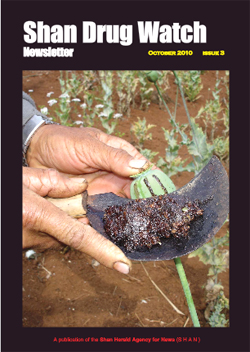The number of poppy fields has increased in every part of Shan State in the 2010-2011season, resulting in increasing output of opium. The reasons for these increases range from more preferable weather conditions, to less restriction by local authorities, according to local sources.
The fields are mostly seen flourishing in areas in Shan State East and South, especially in the Burma Army run People’s Militia areas, and most particularly in areas that have elected militia leaders known for their heavy involvement in the drug business.
 According to villagers, there are three reasons for the increase in poppy plantations. One reason is more preferable weather conditions compared to previous years, where large numbers of poppy fields were washed away by heavy rains, frost and drought.
According to villagers, there are three reasons for the increase in poppy plantations. One reason is more preferable weather conditions compared to previous years, where large numbers of poppy fields were washed away by heavy rains, frost and drought.
“If the weather favors us, we hope to gain a good harvest the coming season,” said one of the farmers from Shan State South.
Another reason for increased poppy production was campaign promises by candidates from the junta-backed Union Solidarity Development Party (USDP), better known as the “Lion Party”, to allow people to cultivate the opium freely if they voted for the party, according to Shan Drug Watch report to be released after 26 June, world anti-Narcotics Day.
One of the villagers in Shan State South recalled one of the promises, “Vote for us and you’ll be free to grow poppies.”
Some of the candidates, who are dubbed as drug dealers among the local villagers like Liu Guoxi, from Kokang constituency, Ho Xiaochang from Kunlong, T. Hkun Myat from Kutkhai, Panhsay Kyaw Myint from Namkham, Kengmai from Muse, Bai Xuoqian from Laogai are now MPs in the parliament, the report said.
Accordingly, another saying that became popular among the villagers was “The Army gets (drug) taxes (and) The Lion gets votes”.
The third reason for increased production is local militia groups were given more authority than ceasefire groups to become involved in the drug trade as they are part of its regime’s anti-insurgency apparatus, the report added.
During the 2009-2010 poppy season, there were 46 out of 55 townships in Shan State growing opium. More were grown in northern Shan State, particularly in areas under the control of the Burmese Army. However, the Burmese regime could make only 32 out of 42 targeted townships “poppy free” in the first two phases of its drug elimination plan, between 1999 and 2009, the previous 2009-2010 report said.
One of the townships that have long disappeared from the “Not free” list, Kunggyan, one of the two townships in the now Kokang Self Administered Zone, has returned to the list, local sources said.
In 1999, the State Peace and Development Council (SPDC) embarked on a 15-year plan to eradicate the cultivation and production of all drugs in Burma by 2014. The total townships targeted were 51: 43 in Shan State, 4 in Kachin, 2 in Kayah or Karenni and 2 in Chin.


